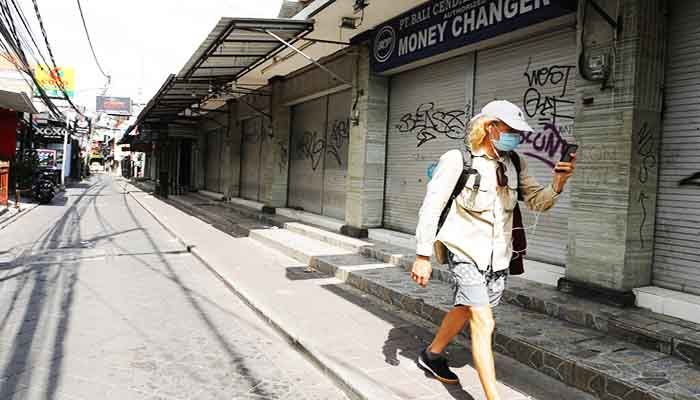
Recession Forecasted for Developing Asian Economies
Published: 15 Sep 2020, 03:37 pm

A foreign tourist walks along an empty road lined with closed shops in Bali, Indonesia. Photo: Collected
Developing economies in Asia will contract this year, the Asian Development Bank said Tuesday in an update to its forecasts.
This contraction will be the first such downturn in nearly six decades.
The update of the ADB's outlook estimates the regional economy will contract 0.7% this year, recovering to 6.8% growth in 2021, reports AP.
Conditions could deteriorate further if the pandemic worsens significantly. The update downgrades growth estimates for many countries in the region where outbreaks of coronavirus have surged.
The report said that China has already begun to recover and will see its economy grow 1.8 percent this year and 7.7 percent in 2021. The 6.1 percent growth for China's economy last year was the slowest pace in decades.
Asia's status as a production base for many medical products, digital devices and optical equipment helped to cushion the blow to trade from the pandemic downturn, the report noted.
Nonetheless, the downturn is the worst since the early 1960s, the report said. ''This has set back efforts to life hundreds of millions of people in our region out of poverty," said the ADB's chief economist, Yasuyuki Sawada.
'L-shaped' recovery
Many countries have imposed border controls, lockdowns and other restrictions to stem the spread of the coronavirus and prevent more outbreaks. But such measures come at a huge economic cost.
To help compensate, regional governments have promised $3.6 trillion, equivalent to about 15 percent of regional economic activity, in subsidies, loans and other support for individuals and businesses.
But small companies that account for most businesses in the region are short of capital to weather the crisis, the ADB said. It expects a recovery to be ''L-shaped," or ''swoosh-shaped" rather than V-shaped.
Even with a recovery, economies will be ''substantially below expectations before COVID-19," Sawada said.
A prolonged pandemic could put countries into debt crises or destabilize their financial markets, the report said. ''Another risk would be worsening geopolitical tensions, most notably potential for US–PRC (China) friction over trade and technology to intensify," it said.
In this file photo, a foreign tourist walks along an empty road lined with closed shops in Bali, Indonesia.
South and Southeast Asian countries have seen some of the worst devastations from the pandemic, with Malaysia, the Philippines, Singapore and Thailand logging double-digit contractions in the April-June quarter from a year earlier. All of their economies are expected to shrink by 5 percent or more this year.
Strong government spending will be crucial to support their recoveries, the report said. The ADB said that ensuring health systems are improved is also vital for sustained growth.
'Bangladesh economy recovering'
Bangladesh's GDP is expected to grow by 6.8 percent in fiscal year (FY) 2021, according to the ADB report.
''The growth reflects gradual recovery, supported by a strong manufacturing base and strengthening of growth in export destinations,'' ADB said in a press release.
Bangladesh's inflation is expected to be 5.5 percent and the current account deficit to narrow to 1.1 percent of GDP in FY2021. Prudent macroeconomic management and speedy implementation of the government stimulus measures are key imperatives to ensure the projected recovery.
''Bangladesh's economy has started recovering from the pandemic. Despite significant pressure on the health and pandemic management systems, the government has managed the economy well with appropriate economic stimulus and social protection measures, ensuring basic services and commodities for the poor and vulnerable,'' said Country Director Manmohan Parkash.
He noted that recent economic performance in exports and remittances, and the government's macroeconomic management including securing foreign funds for economic stimulus and social protection have made this recovery feasible.
''We are encouraged by the increase in exports and remittances, and hope the recovery will be sustained, which will help in achieving the projected growth rate,'' said Parkash.
He said this crisis is an opportunity to undertake further reforms in resource mobilization, export diversification, employment generation, skills development, as well as social protection.
ADB has already provided initial assistance of $600 million in loans and $4.4 million in grants for managing socio-economic impacts of the COVID-19 pandemic and supporting quick recovery. ADB has programmed a $5.9 billion firm and $5.2 billion standby assistance for Bangladesh in 2021-2023.
In FY2021, the government's fiscal and monetary stimulus measures are expected to boost public and private investment. The central bank's expansionary and accommodative monetary policy is expected to aid the projected growth while keeping inflation contained. Strong remittances will stimulate private consumption.